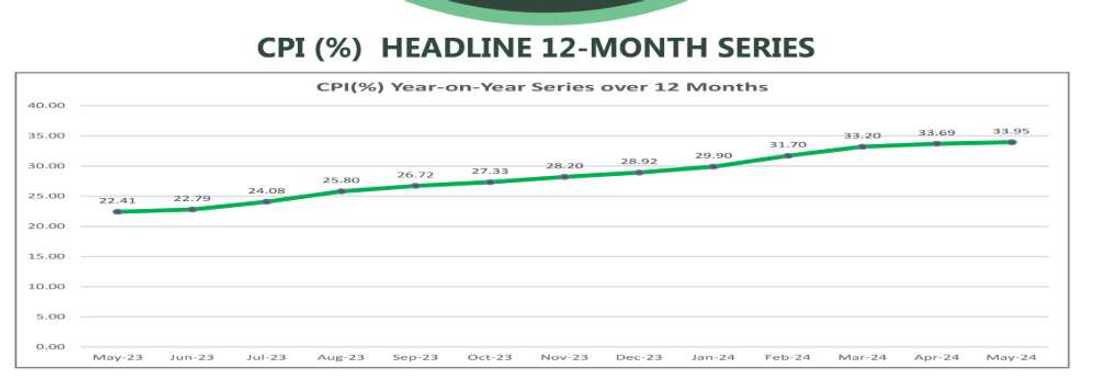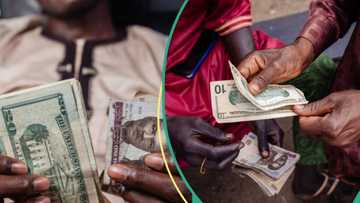Value of Nigeria’s Minimum Wage Now N11,000 As Naira, Inflation Erode Household Finances
- Nigerians are getting poorer as the cost of goods and services increases in markets across the country
- It is no longer just about how much a Nigerian earns but also about how income can be protected on a monthly basis
- Legit.ng has provided deep insights into how the current inflation rate has impacted household finances
PAY ATTENTION: Legit.ng Entertainment Awards 2024 Voting Is Alive. Choose the best entertainer in 15 categories for FREE.
Legit.ng journalist Dave Ibemere has over a decade of business journalism experience with in-depth knowledge of the Nigerian economy, stocks, and general market trends.
The National Bureau of Statistics (NBS) recently revealed that in May 2024, Nigeria's inflation rate increased to 33.95% on a year-on-year basis.
The May 2024 inflation rate showed an increase of 0.26% compared to the April 2024 headline inflation rate.

Source: Facebook
On a year-on-year basis, the inflation rate was 11.54% higher than the rate recorded in May 2023, which was 22.41%.

Read also
Analysts predict good rate for naira as banks, others resume operations 48 hours after shutting down
PAY ATTENTION: Сheck out news that is picked exactly for YOU ➡️ find the “Recommended for you” block on the home page and enjoy!
This shows that the inflation rate (year-on-year basis) increased in May 2024 compared to the same month in the preceding year (May 2023).
While these figures look like every other data, in reality, the inflation figures give a deep understanding of how Nigerians are getting poorer.
Impact of inflation rate
The rising inflation rate means a Nigerians' real income will buy fewer goods compared to previous years, which translates to a decrease in purchasing power.
Real income is the amount of money earned and the purchasing power of that money based on the inflation rate.
Nigerians getting poorer
To contextualise how deeply inflation has impacted the finances of Nigerians, Legit.ng will use the current national minimum wage of N30,000 as labour unions and the Nigerian government try to reach an agreement.
The N30,000 minimum wage under review was first announced in 2019.
Economists calculate the real value of workers' salaries or earnings by dividing income by one plus the inflation rate (Real Income = Wages / (1 + Inflation Rate).
Based on the formula, the value of Nigeria's minimum wage in the last five years is here.
| Year | National minimum wage | Annual inflation rate | Real salary changes |
| 2019 | N30,000 | 11.4% | N30,000 |
| 2020 | N30,000 | 13.25% | N26,580 |
| 2021 | N30,000 | 16.95% | N23,058 |
| 2022 | N30,000 | 18.85% | N19,150 |
| 2023 | N30,000 | 24.66% | N15,540 |
| 2024(May) | N30,000 | 33.95% | N11,629 |
The figures above show that after accounting for inflation over five years, the purchasing power of a salary of N30,000 is now N11,629
The formula can also be used to calculate an individual's current salary.
Another factor putting pressure on Nigerians' finances is the exchange rate of the naira against foreign currencies due to the country's dependence for imported products.
FMDQ data shows that the dollar at the official market is priced at N1,482.72, while in the black market, it is old as high as N1,500.
Expert speaks
Emeka Ucheaga, technical assistant to the managing director/CEO at Credit Direct Limited, in a chat with Legit.ng explained the impact of inflation.
He said:
"Inflation today is not just taking all of your income and savings, it’s also taking jobs. Lots of businesses that have seen cost of production rise due to higher inflation are cutting jobs to keep profit margins from going negative.
"Nigerians have been begging for power for decades now but at cut throat energy prices, Band A is not the type of energy pricing that can support households or businesses financial stability so that’s also causing a lot of pain for consumers and businesses."
Private sector accepts FG's N60,000 minimum wage
Legit.ng earlier reported that the director-general of the Manufacturing Association of Nigeria (MAN), Ajayi Kadri, confirmed that the organised private sector (OPS) accepted President Bola Tinubu's proposal for a new minimum wage of N60,000.

Read also
CBN reduces Customs exchange rate to clear goods at ports, airports after Eid-el-Kabir holidays
The MAN DG clarified that ongoing negotiations between the government, the private sector, and labour were focused on establishing a minimum wage rather than a living wage, which represents the lowest amount that can be paid to any worker in the country.
Ajayi disclosed this during an interview with Channels TV in Abuja on Saturday, June 1.
Proofreading by James Ojo Adakole, journalist and copy editor at Legit.ng.
PAY ATTENTION: Unlock the best of Legit.ng on Pinterest! Subscribe now and get your daily inspiration!
Source: Legit.ng




